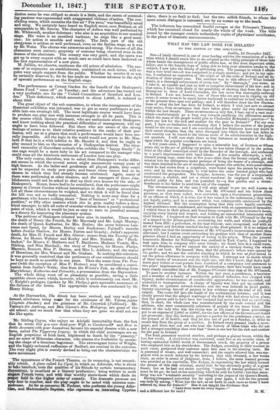The performance at Covent Garden for the benefit of the
Shakspere's House Fund " came off" on Tuesday; and the adventure has turned out The performance at Covent Garden for the benefit of the Shakspere's House Fund " came off" on Tuesday; and the adventure has turned out a very profitable one for the " United Committees of Stratford and Lon- don." Their deficiency, which amounted to about 1,4001, is reduced to about 5001.
The great object of the sub-committee, to whom the management of the theatrical exhibition was intrusted, was to get as many performers as pos- sible into one evening's bill. The most legitimate course would have been to produce one play cast with immense strength in all its parts. This is the course which literary dilettanti, who are enthusiasts about Shakspere, and know nothing about the practical difficulties of management, will say ought to have been followed. But those who are aware of the strong feelings of actors as to their relative positions in the ranks of their pro- fession, will see at a glance that such a performance would have been mo- rally impossible. All the logic in the world would not prove to Mr. Mac- beth B that he is a whit inferior to Mr. Hamlet A, and that he ought to play second to him on the occasion of a Shaksperian festival. The itine- rant reconciler of discordant animals who exhibits the " happy family " in one cage would be a mere baby in his art compared to the manager who could coax all the histrionic eminences of London into one play. The only course, therefore, was to select from Shakspere's works differ- ent scenes in which the several actors might successively occupy posts of high honour. As the ladies and gentlemen all played gratis, they could not be expected to study new parts; and hence those scenes had to be chosen in which they had already become celebrated. Again, many of them were performing at other theatres, and the managers of those esta- blishments could not be asked to shut up their own houses for the sake of Shakspere's. Hence, hours had to be considered, that the performers might appear at Covent Garden without interruption to their regular avocations. Let all these circumstances be weighed, and we think it will be found that the bill was not so badly concocted. Nothing is more easy than for a gentleman who knows nothing about " lines of business" or professional position," or fifty other matters which rise in grim reality before a thea- trical manager, to talk all sorts of oracular wisdom from a purely resthetical point of view, which it would be just as easy to turn to practical account as a theory for improving the planetary system.
The portions of Shakspere selected were nine in number. There were, the death of Henry the Fourth, for Mr. Macready and Mr. Leigh Murray;
the death of Queen Katharine, for Mrs. Butler; the scene between Lau- rence and Speed, for Messrs. Harley and Buckstone; Falstaff's recruits before Justice Shallow, for Messrs. Farren and Granby ; Juliet's apparent death, for Miss H. Faucit and Mrs. Glover; scenes from the Taming of the Shrew, for Messrs. Webster and Keeley and Mrs. Nisbett; the " Buck- basket," for Messrs. C. Mathews and T. Matthews, Madame Vestris, Mrs.
Stirling, and Miss Marshall; the story of Prospero, for Messrs. Phelps, Marston, Bennett, Miss P. Horton, and Miss L. Addison; and the statue
of Hermione, for Mrs. Warner and Mr. Graham. In making this selection, it was generally contrived that the performers of one establishment should be kept as muoh as possible in one piece. Thus the scene from The Tem- pest (with the exception of Miss P. Horton) may be considered a contri- bution from Sadler's Wells; that from the Winter's Tale, an offering from Marylebone; Katharine and Petruchio, a presentation from the Haymarket.
The whole thing went off as pleasantly as possible; saving a little squabble about seats, which, however, while it unfortunately cut short Mr. C. Knight's prologue, (spoken by Mr. Phelps,) gave agreeable assurance of the fullness of the house. The appropriate music was conducted by Sir Henry Bishop.


























 Previous page
Previous page